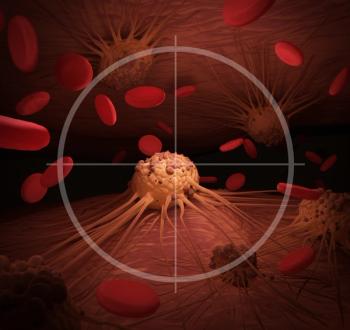
Patients with previously untreated HLA-A*02:01+ mUM saw improvements in OS, PFS, and ctDNA clearance.

Patients with previously untreated HLA-A*02:01+ mUM saw improvements in OS, PFS, and ctDNA clearance.

Compared to placebo plus chemotherapy, nivolumab plus chemotherapy had also improved event-free survival and both pathological complete response and major pathologic response rates.

According to investigators, additional research is necessary to further understand how lutetium impacts overall survival in patients with metastatic prostate cancer.

The trial data showed ongoing clinical benefit in patients with advanced endometrial cancer who completed pembrolizumab and continued on lenvatinib vs chemotherapy alone.

Compared to chemotherapy alone, amivantamab plus chemotherapy had a better objective response rate and prolonged progression-free survival and overall survival.

This is the first phase 3 trial to evaluate a KRAS G12C-inhibitor plus an anti-epidermal growth factor receptor antibody for this type of colorectal cancer.

The novel combination met the co-primary endpoints of progression-free survival and overall survival during the CheckMate -901 trial, also demonstrating sizeable improvement in objective response.

Not only did taletrectinib shrink tumors in 92% of patients who were tyrosine kinase inhibitor -naïve, but 89.5% of patients continued to respond to treatment at 12 months.

Compared to endocrine therapy alone, the combination of ribociclib and endocrine therapy lowered the risk of cancer recurrence in patients with early breast cancer by 25.2%.

The statistically significant and clinically meaningful improvement in disease-free survival is “practice-changing” and may represent a “paradigm shift” in treatment, according to experts.

Triplet combination demonstrates a reduction in the risk of disease progression or death in individuals with previously untreated advanced intermediate- or poor-risk renal cell carcinoma.

Therapy shows positive clinical efficacy and favorable tolerability as a monotherapy and in combination with cetuximab in heavily pretreated patients who have a KRASG12C mutation.

New research presented at ESMO Congress found that certain patients with advanced melanoma administered a combination of cemiplimab with fianlimab experienced a median progression-free survival of 2 years.

Researchers at the European Society for Medical Oncology Congress presented findings that show osimertinib may clinically reduce the risk of lung cancer recurrence.

Trastuzumab deruxtecan produces a confirmed objective response rate of 53.8% and 42.9% in the 5.4 mg/kg arm and 6.4 mg/kg treatment arms, respectively, among patients with HER2 mutant non-small cell lung cancer.

An estimated 31.4% of individuals with non-squamous non–small cell lung cancer treated with the combination were alive at 3 years compared to 17.3% for those on chemotherapy alone.

Results demonstrated a 64.5% confirmed objective response rate in patients treated with the investigational combination.

Ribociclib with endocrine therapy was found to increase the median overall survival of patients with HR+/HER2- advanced breast cancer with visceral metastases to nearly 5 years.

Data presented at the 2022 ESMO congress show poziotinib has high activity in both treatment-naïve and previously treated patients with non-small cell lung cancer.

New results presented at the 2022 ESMO conference reinforce the potential of rucaparib as a first-line maintenance treatment option in a broad population of patients with ovarian cancer.

Data presented at the European Society for Medical Oncology Congress showed that sotorasib increased progression-free survival to 1 year in 25% of patients with KRAS G12C-mutated non-small cell lung cancer.

According to the investigators, in vitro functional studies demonstrate potent antitumor activity of ATA2271 following repeat antigen stimulation.

The combination of tislelizumab and chemotherapy demonstrated a statistically significant improvement in progression-free survival.

Pharmacy Times spoke with Dr. Bradley Monk, investigator for KEYNOTE-826, #LBA2, which was presented at the ESMO Congress 2021, about the study and its importance to the world of cervical cancer.

At ESMO 2020, researchers discussed some long-awaited data regarding postoperative radiotherapy used in patients with non-small cell lung cancer following complete resection and after (neo) adjuvant chemotherapy.

Among patients with cervical cancer, there was no significant difference found between the risk of recurrence, local recurrence, or death among individuals who either completed or abandoned a radical uterine procedure following the intraoperative detection of a positive pelvic lymph node.

Study shows that upon hospital admission for cancer, many patients already have a high prevalence of malnutrition per Global Leadership Initiative on Malnutrition criteria.

The results from a cohort of patients with rare sarcomas in the phase 2 study, presented by professor Jean-Yves Blay, MD, investigated the efficacy and safety of single agent pembrolizumab in rare cancers.

A new study showed that nivolumab was effective in patients with pathogenic exonuclease domain POLE mutated mismatch repair.

The effects of pralsentinib were especially pronounced in treatment-naïve patients with medullary thyroid cancer.